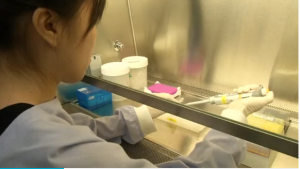
(Reuters) — Researchers in Singapore have developed a test kit for the Zika virus that could be used in hospitals soon.
Global health officials have said the virus has been linked to severe birth defects in thousands of babies in Brazil, and is rapidly spreading internationally.
On Wednesday (February 10) China confirmed its first case in a man who had recently travelled to South America, the official Xinhua news agency reported.
Masafumi Inoue at A*STAR, a research institute in Singapore, said progress on the test kit has accelerated since they started a few months ago.
“We started last year when we got information from Brazil. So so it’s more than a few months already past. In the beginning, we didn’t do very much, because we didn’t notice the danger of the Zika virus, but this year, more news has come, and we put energy to develop the Zika virus kit,” he said.
Inoue said a blood sample containing the patient’s DNA is first extracted. The genome is then amplified to make detection easier.
The whole process takes about three hours, and is 99 percent accurate, he added.
The test kit is also a three-in-one. It diagnoses Zika, dengue and chikungunya — all of them have similar symptoms and can be carried by the Aedes mosquito.
Researchers say this makes the test kit more economical and efficient.
Sebastian Maurer-Stroh is the other researcher behind the test kit and specialises in the virus itself.
Maurer-Stroh was asked about how Zika virus compared to the Ebola virus, which killed more than 11,300 people in its two-year epidemic.
“One cannot marginalise any virus, but in terms of the total global spread and the case fatality rate, it cannot be compared to Ebola,” he said.
Maurer-Stroh said they use a molecular diagnostic test, which takes a few hours, compared to the common antibodies test, which can take several days to show results.
The researchers estimate that it will reach hospitals by the end of March.
Global health authorities suspect the mosquito-borne Zika virus has caused a spike in Brazil in microcephaly, a birth defect marked by an abnormally small head.
As a result, the World Health Organization declared an international health emergency February 1, and the U.S. Centers for Disease Control and Prevention (CDC) is advising pregnant women or those considering becoming pregnant to avoid travel to places with Zika outbreaks.







